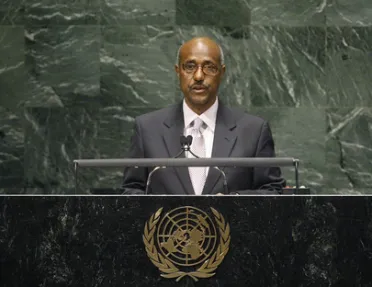Statement
Statement summary
SEYOUM MESFIN, Minister for Foreign Affairs of Ethiopia, reviewed the salient aspects of his country’s political and economic transformation, most notably its democratization process, which was now in its second decade. The process had been “bumpy and fraught with difficulties”, but despite its seemingly insurmountable difficulties, Ethiopia’s motto of perseverance had paid off. His country’s single-minded focus on building institutions of democracy, good governance and rule of law was the crux of its efforts towards building a stable political system. Nevertheless, the essence of all its endeavours was the devolution of power to its people, he said, and stressed a firm belief that democracy is “not an option but a means of survival for the country”, and was an irreversible process that had taken “deep roots” at the state level and society at large.
Democracy, however, was not an end to itself, but a means to bring about a better life for the people, he said. The country’s development strategy envisaged democracy as the cornerstone of political and economic governance. To that end, development in Ethiopia was in full swing; it had registered an annual average of double-digit economic growth over the past seven years. Its successful achievements during that time helped to formulate its ambitious five-year economic “Growth and Transformation Plan”, which would lay the foundation for nation building, and remove the “bottlenecks” that prevented its progress towards reaching the Millennium Goals. First and foremost, the plan would help make “poverty history in our country”, he said, and would mark the end of an era of food insecurity and dependency on aid, for which he expressed his gratitude to the international community. Despite progress in sub-Saharan Africa, the global and economic crisis caused many African countries to lag behind other regions of the world in reaching its Goals. Therefore, progress toward 2015 would require a commitment and accountability from the international community, he said.
Turning to climate change, he hoped that the upcoming Cancun meeting would produce a legally binding commitment to allocate change. Regarding renewable energy, Ethiopia committed to a zero carbon emission by 2025, and since 2008, had annually planted over a billion trees throughout the country. Energy development was key to fighting poverty, and over 1.4 billion people remained without it. Therefore, electrification of rural areas was a top priority, with a target of providing energy to 75 per cent of the population by 2015. In five years, the country would have 10,000 megawatts of hydropower with parallel development of its geothermal, biofuel, wind and solar power potential. Nevertheless, progress in those key areas required external assistance.
He said Ethiopia remained on the forefront of maintaining global peace and security, being an active participant in peacekeeping since the 1950s. Nevertheless, the threat of extremism continued unabated in Somalia, and there would be little progress without the highest level of commitment within the Transitional Federal Institutions (TFI) of Somalia. In a recent meeting, the Intergovernmental Authority on Development (IGAD) Council of Ministers called upon them to work together to address the challenges. Furthermore, it reaffirmed the Djibouti Process as the sole basis for peace and reconciliation in Somalia, and expressed regret that Eritrea continued to play the role of a “spoiler” and the main conduit of arms to the terrorist groups. With regard to Sudan, success there would be a significant success for Africa as a whole and failure would be a serious catastrophe. In closing, he reiterated the “destructive role” that the Government of Eritrea played since its independence, and urged the Security Council to take the necessary steps to compel the country to live up to expectations under resolution 1907 (2009). As a founding Member of the United Nations, Ethiopia underscored the importance for its reform in order to ensure its vitality. Of particular importance was the ongoing cooperation and consultation between the Security Council and the African Union Peace and Security Council. He said, “We should continue with this cooperation and Ethiopia will do whatever is necessary in that regard.”
Full statement
Read the full statement, in PDF format.
Photo

Previous sessions
Access the statements from previous sessions.
